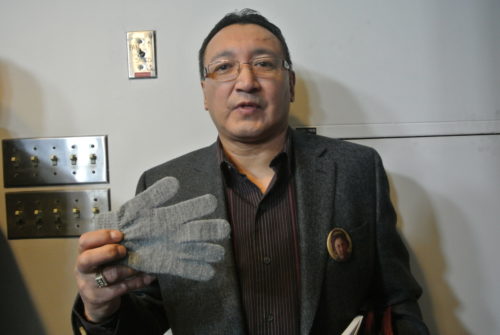First Nations leaders are once again calling on the Canadian federal government to provide long-term support and resources to communities facing down a horrifying suicide crisis.“Our community plan was turned down by government, and now two are dead,” Joshua Frogg, band manager and spokesperson of Wapekeka First Nation, said in a statement ahead of a press conference on Parliament Hill on Thursday.His niece, 12-year-old Chantel Fox, killed herself on Jan. 10 on the northern Ontario reserve, just two days after Jolynn Winter, also 12, took her own life.They were part of a tragic suicide pact that has gripped the community for months.“It’s time for Canada to wake up,” Frogg said at the press conference, clutching his dead niece’s grey winter glove.Frogg says Wapekeka discovered the pact months ago, and asked for money from Health Canada to work with the children and help stop the tragedy from unfolding. But the money couldn’t get out the door fast enough, a Health Canada spokesperson has admitted to CBC.“The circumstances in a number of First Nations communities across the country are indeed troubling. And, particularly there is a community in Ontario, Wapekeka, where there were unfortunately two young people who died by suicide in recent weeks,” said Health Minister Jane Philpott on Thursday.“There are deep challenges in these communities that have led to a situation where young people don’t feel hope for their future,” the minister said. “We have worked with First Nations communities and other Indigenous peoples across the country to develop a solution that they need. In the case of First Nations, they have developed a First Nations Mental Wellness Continuum Framework, and we intend to continue to support that.”The minister said the government has spent $300 million this year in “mental wellness” nationwide, and $24 million in the Nishnawbe Aski Nation which contains Wapekeka.There have been 523 suicides in the 49 nations making up the regional group, Nishnawbe Aski Nation, since 1986, NAN said in a statement. Over 70 of those were children aged 10 to 14, and nearly 200 were youth ages 15 to 20.Youth suicides among Indigenous peoples is fives times the national average, a crisis Assembly of First Nations Chief Perry Bellegarde traced back to the legacy of residential schools, which ripped families apart and imposed decades of psychological abuse on children. Wapekeka’s trauma is also tied to convicted pedophile Ralph Rowe, an Anglican priest who traveled in the area and committed sex crimes in the 1970s and 1980s.Nishnawbe Aski Nation Grand Chief Alvin Fiddler said Philpott and Indigenous Affairs Minister Carolyn Bennett have both reached out to him and the Wapekeka chief. The focus has been on the immediate needs of the community, and ensuring that youth deemed high risk are safe.Meanwhile, it’s been almost a year since Ontario First Nations leaders declared a public health emergency over a spate of suicides.Since then, in addition to the seven who killed themselves, 99 more have attempted suicide and there have been 131 threats. Many more go unreported, said Mushkegowuk Council Grand Chief Jonathan Solomon at the press conference.Frontline workers are burnt out, communities are tired, and governments “drag their feet” he said, while “we continue to bury our loved ones.”
“We have worked with First Nations communities and other Indigenous peoples across the country to develop a solution that they need. In the case of First Nations, they have developed a First Nations Mental Wellness Continuum Framework, and we intend to continue to support that.”The minister said the government has spent $300 million this year in “mental wellness” nationwide, and $24 million in the Nishnawbe Aski Nation which contains Wapekeka.There have been 523 suicides in the 49 nations making up the regional group, Nishnawbe Aski Nation, since 1986, NAN said in a statement. Over 70 of those were children aged 10 to 14, and nearly 200 were youth ages 15 to 20.Youth suicides among Indigenous peoples is fives times the national average, a crisis Assembly of First Nations Chief Perry Bellegarde traced back to the legacy of residential schools, which ripped families apart and imposed decades of psychological abuse on children. Wapekeka’s trauma is also tied to convicted pedophile Ralph Rowe, an Anglican priest who traveled in the area and committed sex crimes in the 1970s and 1980s.Nishnawbe Aski Nation Grand Chief Alvin Fiddler said Philpott and Indigenous Affairs Minister Carolyn Bennett have both reached out to him and the Wapekeka chief. The focus has been on the immediate needs of the community, and ensuring that youth deemed high risk are safe.Meanwhile, it’s been almost a year since Ontario First Nations leaders declared a public health emergency over a spate of suicides.Since then, in addition to the seven who killed themselves, 99 more have attempted suicide and there have been 131 threats. Many more go unreported, said Mushkegowuk Council Grand Chief Jonathan Solomon at the press conference.Frontline workers are burnt out, communities are tired, and governments “drag their feet” he said, while “we continue to bury our loved ones.”
Advertisement
Wapekeka’s request was made at an “awkward time” in the funding cycle, in September, Health Canada regional executive Keith Conn told CBC News, and money had already been divvied up.“We don’t have necessarily a flexible fund that we hold back for different projects,” he is quoted in CBC as stating. The proposal is now being funded through unspent funds, he said.But Charlie Angus, an NDP MP who speaks frequently on Indigenous issues, assigned different motivations.“It has to be said: If these were white kids … people would be fired,” he told reporters.Angus called for long-term funding agreements with the communities on par with provincial funding, and an action plan to stop the “pattern of deep dysfunction.”Four children have been flown out of Wapekeka for medical treatment, and another 26 were at high risk after being triggered by the deaths, the community said in a statement.“We continue to bury our loved ones.”
Advertisement
